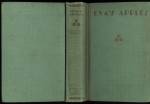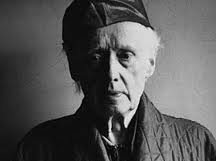Eva's Apples by William Gerhardi. New York. 1928. Duffield & Company. hardcover. 394 pages.
 FROM THE PUBLISHER -
FROM THE PUBLISHER -
William Gerhardi’s third novel, published in England as JAZZ AND JASPER. The American publisher, Duffield, insisted on the title change claiming that the word ‘jazz’ had been ‘worn threadbare’ in the States. Gerhardi always wanted the title to be DOOM, which it eventually became in later editions in later editions. Despite its bleak title, DOOM is Gerhardie’s most wildly funny novel. It is the story of Frank Dickin, an impoverished young novelist and his involvement, on the one hand with an eccentric family of Russian emigres and in particular their beautiful daughter Eva - and, on the other with an all-powerful newspaper magnate, Lord Ottercove, who decides to take him up as a lost cause. The untameable comic pot-pourri also involves a mad English lord who plans to destroy the world, and, with an outrageous sleight of hand, that only Gerhardie could get away with, the novel slowly slips from social comedy toward apocalyptic speculation. ‘Amusing, brilliant and quite, quite mad.’ - Herald Tribune.
 William Alexander Gerhardie (1895-1977) was a British (Anglo-Russian) novelist and playwright. Gerhardie (or Gerhardi: he added the ‘e’ in later years as an affectation) was one of the most critically acclaimed English novelists of the 1920s (Evelyn Waugh told him ‘I have talent, but you have genius’). H.G Wells was a ferocious champion of his work. His first novel Futility, was written while he was at Cambridge and drew on his experiences in Russia fighting (or attempting to fight) the Bolsheviks, along with his childhood experiences visiting pre-revolutionary Russia. Some say that it was the first work in English to fully explore the theme of ‘waiting’ later made famous by Samuel Beckett in WAITING FOR GODOT, but it is probably more apt to recognize a common comic nihilism between those two figures. His next novel, THE POLYGLOTS is probably his masterpiece (although some argue for DOOM). Again it deals with Russia (Gerhardie was strongly influenced by the tragi-comic style of Russian writers such as Chekhov who he wrote a study of while in College). He collaborated with Hugh Kingsmill on the biography ‘The Casanova Fable’, his friendship with Hugh being both a source of conflict over women and a great intellectual stimulus. After World War II Gerhardie’s star waned, and he became unfashionable, and although he continued to write, he had nothing published after 1939. After a period of poverty-stricken oblivion, he lived to see two ‘definitive collected works’ published by Macdonald (in 1947-49 and then revised again in 1970-74). More recently, both Prion and New Directions Press have been reissuing his works. Asked how to say his name, he told The Literary Digest ‘Pronounced jer (as Ger in Gerald) hardy, with the accent on the a: jer-har’dy. This is the way I and my relatives pronounce it, tho I am told it is incorrect. Philologists are of the opinion that it should be pronounced with the g as in Gertrude. I believe they are right. I, however, cling to the family habit of mispronouncing it. But I do so without obstinacy. If the world made it worth my while I would side with the multitude.’ (Charles Earle Funk, What’s the Name, Please?, Funk & Wagnalls, 1936).
William Alexander Gerhardie (1895-1977) was a British (Anglo-Russian) novelist and playwright. Gerhardie (or Gerhardi: he added the ‘e’ in later years as an affectation) was one of the most critically acclaimed English novelists of the 1920s (Evelyn Waugh told him ‘I have talent, but you have genius’). H.G Wells was a ferocious champion of his work. His first novel Futility, was written while he was at Cambridge and drew on his experiences in Russia fighting (or attempting to fight) the Bolsheviks, along with his childhood experiences visiting pre-revolutionary Russia. Some say that it was the first work in English to fully explore the theme of ‘waiting’ later made famous by Samuel Beckett in WAITING FOR GODOT, but it is probably more apt to recognize a common comic nihilism between those two figures. His next novel, THE POLYGLOTS is probably his masterpiece (although some argue for DOOM). Again it deals with Russia (Gerhardie was strongly influenced by the tragi-comic style of Russian writers such as Chekhov who he wrote a study of while in College). He collaborated with Hugh Kingsmill on the biography ‘The Casanova Fable’, his friendship with Hugh being both a source of conflict over women and a great intellectual stimulus. After World War II Gerhardie’s star waned, and he became unfashionable, and although he continued to write, he had nothing published after 1939. After a period of poverty-stricken oblivion, he lived to see two ‘definitive collected works’ published by Macdonald (in 1947-49 and then revised again in 1970-74). More recently, both Prion and New Directions Press have been reissuing his works. Asked how to say his name, he told The Literary Digest ‘Pronounced jer (as Ger in Gerald) hardy, with the accent on the a: jer-har’dy. This is the way I and my relatives pronounce it, tho I am told it is incorrect. Philologists are of the opinion that it should be pronounced with the g as in Gertrude. I believe they are right. I, however, cling to the family habit of mispronouncing it. But I do so without obstinacy. If the world made it worth my while I would side with the multitude.’ (Charles Earle Funk, What’s the Name, Please?, Funk & Wagnalls, 1936).